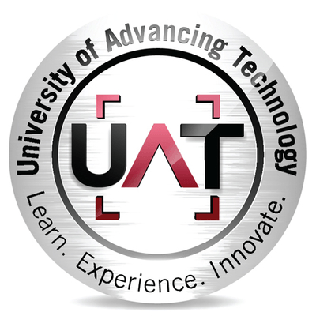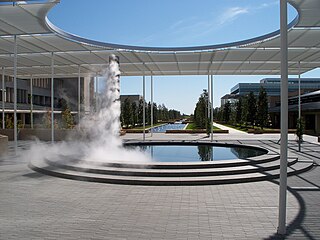
Indiana University–Purdue University Indianapolis, commonly referred to as IUPUI, is a public research university in Indianapolis, Indiana, United States. It is a collaboration between Indiana University and Purdue University that offers undergraduate, graduate, and professional degrees from both universities. Administered primarily through Indiana University as a core campus and secondarily through Purdue University as a regional campus, it is Indiana's primary urban research and academic health sciences institution. IUPUI is located in downtown Indianapolis along the White River and Fall Creek.

Chongqing University of Posts and Telecommunications is a public university in China's fourth largest municipality: Chongqing. It focuses on the research and education in the field of information and communications and enjoys nationwide reputation in the study of postal communications, telecommunications and information technology, especially for its research and commercialization in 3G mobile technologies, optical sciences and related digital research. It is one of the four universities of Posts and Telecommunications in China and the only one of its kind in the Southwest China. It enjoys a good reputation in the ICT industry in China due to its high-quality education and research and the large number of alumni working in the ICT industry. Due to its achievements and contributions in the field of information and communications technology, especially in the development of China's own digital communications systems, CQUPT is considered as the cradle of China's digital communications.

Eugene Howard Spafford, known as Spaf, is an American professor of computer science at Purdue University and a computer security expert.
Samuel Standfield Wagstaff Jr. is an American mathematician and computer scientist, whose research interests are in the areas of cryptography, parallel computation, and analysis of algorithms, especially number theoretic algorithms. He is currently a professor of computer science and mathematics at Purdue University who coordinates the Cunningham project, a project to factor numbers of the form bn ± 1, since 1983. He has authored/coauthored over 50 research papers and four books. He has an Erdős number of 1.
Microsoft Research (MSR) is the research subsidiary of Microsoft. It was created in 1991 by Richard Rashid, Bill Gates and Nathan Myhrvold with the intent to advance state-of-the-art computing and solve difficult world problems through technological innovation in collaboration with academic, government, and industry researchers. The Microsoft Research team has more than 1,000 computer scientists, physicists, engineers, and mathematicians, including Turing Award winners, Fields Medal winners, MacArthur Fellows, and Dijkstra Prize winners.

The B. Thomas Golisano College of Computing and Information Sciences is one of the largest colleges at the Rochester Institute of Technology (RIT), and is home to the institute's computing education and research facilities. Golisano College is home to RIT's computer science, cybersecurity, information sciences and technologies, and software engineering departments, and to the Ph.D. program in computing and information sciences, and the School of Interactive Games & Media. Golisano College is housed in a 125,000 square foot facility, opened in 2003 on RIT's campus in Rochester, New York. In 2020, the facility added an additional 52,000 square foot building, which joins the original Golisano College on all three floors and houses the ESL Global Cybersecurity Institute.

University of Advancing Technology (UAT) is a private for-profit university in Tempe, Arizona. Founded in 1983, UAT integrates technology into its general education requirements. The institution offers core classes, as well as deep sets of courses in each major. Each student is required to complete a "Student Innovation Project" and internship to graduate.
The College of Engineering and Computing, commonly known as CEC, formerly the Graduate School of Computer and Information Sciences, at Nova Southeastern University provides educational programs to prepare students for leadership roles in technology. The college is located on the main campus in Fort Lauderdale, Florida within the Carl DeSantis building. In addition to its regional accreditation by the Commission on Colleges of the Southern Association of Colleges and Schools, NSU has been designated a National Center of Academic Excellence in Information Assurance Education by the U.S. National Security Agency and the United States Department of Homeland Security.
Victor Raskin is a distinguished professor of linguistics at Purdue University. He is the author of Semantic Mechanisms of Humor and Ontological Semantics and founding editor of Humor, the journal for the International Society for Humor Studies.

Kennesaw State University (KSU) is a public research university in the state of Georgia with two campuses in the Atlanta metropolitan area, one in Kennesaw and the other in Marietta on a combined 581 acres (235 ha) of land. The school was founded in 1963 by the Georgia Board of Regents using local bonds and a federal space-grant during a time of major Georgia economic expansion after World War II. KSU also holds classes at the Cobb Galleria Centre, Dalton State College, and in Paulding County (Dallas). The total enrollment exceeds 45,000 students making KSU the third-largest university by enrollment in Georgia.
The Information Networking Institute (INI) was established by Carnegie Mellon in 1989 as the nation's first research and education center devoted to information networking.
Discovery Park is a 40-acre (160,000 m2) multidisciplinary research park located in Purdue University's West Lafayette campus in the U.S. state of Indiana. Tomás Díaz de la Rubia, an energy and resources industry executive who also spent a decade as a top scientist and administrator at Lawrence Livermore National Laboratory, serves as Discovery Park's Vice President.
Elisa Bertino is a professor of computer science at Purdue University and is acting as the research director of CERIAS, the Center for Education and Research in Information Assurance and Security, an institute attached to Purdue University. Bertino's research interest include data privacy and computer security.

The University of Texas at Dallas is a public research university in the University of Texas System. The University of Texas at Dallas main campus is located in Richardson, Texas. The University of Texas at Dallas offers over 148 academic programs across its seven schools, including 57 baccalaureate programs, 59 masters programs and 32 doctoral programs, and hosts more than 40 research centers and institutes. The school also offers over 50 undergraduate and graduate certificates.

The Khoury College of Computer Sciences is the computer science school of Northeastern University in Boston, Massachusetts. It was the first college in the United States dedicated to the field of computer science when it was founded in 1982. In addition to computer science, it specializes in data science and cybersecurity. The college was also among the first to offer an information assurance degree program.
The National Cyber Security Hall of Fame, founded by Larry Letow and Rick Geritz, was established in 2012 to recognize the contributions of key individuals in the field of cyber security; its mission statement is, Respect the Past - Protect the Future. According to its website, it is designed to honor the innovative individuals and organizations which had the vision and leadership to create the fundamental building blocks for the cybersecurity Industry. The organization also highlights major milestones in the industry's 40-year history through a timeline representation, which includes inductees and their corresponding accomplishments.
Anupam Joshi is the Oros Family Professor and Acting Dean of the UMBC College of Engineering and Information Technology in the University of Maryland Baltimore County, Baltimore, MD, USA. He is also the Director of the UMBC Center for Cybersecurity.
Catherine Ann Meadows is an American cryptographer known for her development of tools for the formal verification and automated discovery of flaws in cryptographic protocols. She is a senior researcher in the Center for High Assurance Systems at the Naval Research Laboratory and the head of the laboratory's Formal Methods Section.
David S. Ebert is a computer scientist, holding the position of Silicon Valley Professor of Electrical and Computer Engineering Department at Purdue University.








